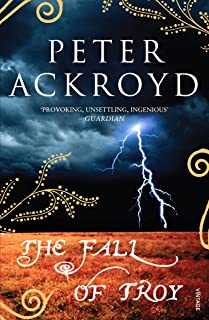Tuesday, January 6, 2009
Asylum by Patrick McGrath
Ways Of Escape by Graham Greene
Lord Of The Flies by William Golding
Brick Lane by Monica Ali
The Fall Of Troy by Peter Ackroyd
Sunday, December 7, 2008
Day Seven of Forever Friends
Thank you for reading this blog entry! This is the seventh post on the Forever Friends blog tour and we have made it through the first week! Thanks again to everyone following the tour for your support! I hope the next seven days are as enjoyable and eventful as the last seven days. On Tuesday, the book finally became available at the amazing price of $9.99. This was a mistake made by amazon.com that allowed many members of the Published Authors Network and forum to take advantage of their mistake. You will find a link to amazon.com at the bottom of this post. The same day the book became available from all the online bookstores, I received the first review of Forever Friends by Apex Reviews.
In the review, the reviewer, Linda Waterson referred to the different sections in the book:
Compiled in various sections, ranging from “Family Friends” to “Lost Friends” to “False Friends” to “Spiritual Friends,” the literary offerings contained therein just as equally travel the full spectrum of friendship, covering all imaginable ground in-between. There is reminiscing over childhood heroes, protectors of the four-legged ilk, and gracious musings over friends who were – quite literally – lifesavers. There are also poems that wish for the spreading of global goodwill, as well as verses rendered in homage to friends that are gone, but not forgotten.
She also made reference to the use of quotes at the beginning of each section:
For added contextual flavor, preceding each section is an insightful blurb helping to foster within the reader a greater understanding of what that particular facet of friendship is really all about. Consider, for example, this literary jewel that precedes the “False Friends” section:
False friends are like our shadow, keeping close to us while we
walk in the sunshine, but leaving us the instant we cross into the shade.
Christian Nestell Bovee
Philip Spires short story, Stranger than Friends, is the first book in this section. The well-crafted characterizations and authentic dialogue make for an entertaining read. The boredom of the staff and the insensitivity of the clientele in the bar of the Old Hotel in an off the track village, are all too obvious to an unmarried couple staying at the hotel overnight. In the morning, things have come to a head and one family will not be the same as it was the night before as people who were once friends become strangers to each other. I would like to congratulate Philip on a story that draws in the reader right from the beginning as two strangers descend the steep path to a small tightly-knit place, where outsiders are welcome – but only for a short stay.
I would also like to thank Philip for inviting me to make this post on his blog and for giving me the opportunity to add a bit more information about the anthology.
It isn’t too late to order a copy and, as I keep saying, you will not be disappointed!
Forever Friends is available now from all major online stores, including amazon.com:
and barnesandnoble.com:
Thanks again for reading this and best wishes for the holiday season!
Shelagh Watkins
Please follow the tour to learn more about the book.
Blog Tour
December 1 Chelle Cordero
December 2 Zada Connaway
December 3 Mary Muhammad
December 4 Helen Wisocki
December 5 Pam Robertson
December 6 Dick Stodghill
December 7 Philip Spires
December 8 Milena Gomez
December 9 L. Sue Durkin
December 10 A. Ahad
December 11 Malcolm R. Campbell
December 12 Lynn C. Johnston
December 13 Dianne Sagan
December 14 Donald James Parker
December 15 Karina Kantas
December 16 Grace Bridges
December 17 Tiziana Rinaldi Castro
December 18 Yvonne Oots
December 19 Dana Rettig









